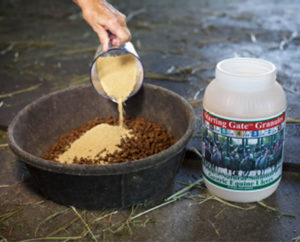
Of the Top Five Most Common Health Problems in Horses, Gastric Ulcers is ranked #1 in insurance claims paid out, exceeding Arthritis #2, Colic #3, Inflamed Ligaments #4, and Laminitis #5.
Source: Allianz Insurance and Pet Plan Equine
Stomach ulcers are the major health epidemic in the equine world and may be preventable. More than 52% of horses of all breeds from one to twenty-four years old had gastric ulcers during a recent gastro-endoscopic study, and 80-90% of horses in training. Symptoms include – poor appetite, dullness, attitude changes, decreased performance, poor body and hoof condition, rough hair coat, weight loss and colic.
Causes of Gastric Equine Ulcers
Horse Physiology – Horses are grazing animals. Unlike humans, they have evolved to eat many small meals per day. The small volume of the stomach and the rapid passage of food to the small intestine is the reason that horses eat almost continuously. Gastric pH can drop lower than 2 after a horse stops consuming food. A horse’s stomach will continue to produce strong acid even if food is not present. Horses in training – Horses are often not fed immediately before training or competing, which results in a significant increase in stomach acidity. Also, horses can become excited during training and racing, further lowering gastric pH. Transporting Horses – It is a generally accepted theory that horses being transported are under a lot of stress. This event can induce symptoms of gastric ulcers. These are just a few of the many influences that contribute to gastric ulceration.
Management of Equine Gastric Ulcers
Unless the mucous lining of the stomach is strong enough to withstand the powerful acids produced there, ulcers often develop in horses. There are various therapeutic protocols used for the control of equine gastric ulcers. These include antacids (think of products such as Tums and Rolaids) and H2 acid blockers such as the pharmaceutical products Pepcid and Prilosec. These treatments will reduce acid in the stomach and can reduce the occurrence of ulcers, but there may be unintended negative consequences from the overuse of acid-blocking medications.
Stomach acid is an essential component of the initial stage of the digestive process. If there is not enough acid present to break down food, it will pass into the small intestine only partially digested. The nutrients won’t be in a form that can be absorbed in the small intestine, and the horse will not get adequately nourished.
 There is a natural way to protect and treat horses with gastric ulcers. When a horse is given Starting Gate Granules from SBS EQUINE added to its regular food ration, the acid in the fundic portion of the stomach immediately breaks it down into a mix of reactive phospholipids. The mixed- phospholipids and apple pectin in the Starting Gate Granules are both hydrophilic and hydrophobic and interact with the cell membranes of the mucosal epithelium to strengthen the mucosa.
There is a natural way to protect and treat horses with gastric ulcers. When a horse is given Starting Gate Granules from SBS EQUINE added to its regular food ration, the acid in the fundic portion of the stomach immediately breaks it down into a mix of reactive phospholipids. The mixed- phospholipids and apple pectin in the Starting Gate Granules are both hydrophilic and hydrophobic and interact with the cell membranes of the mucosal epithelium to strengthen the mucosa.
These ingredients are useful in making the stomach lining stronger at the cellular membrane level. They have also shown to help wean horses off of acid-blocking drugs as well as treating and preventing the occurrence of stomach ulcers.
For more articles on equine gastric ulcers and other horse related issues, check out www.sbsequine.com/articles.




